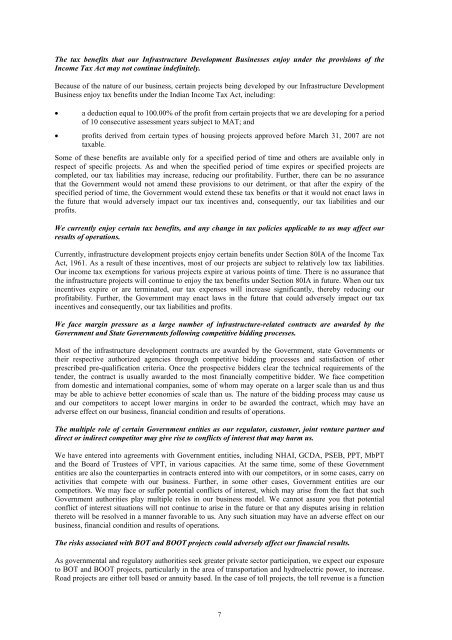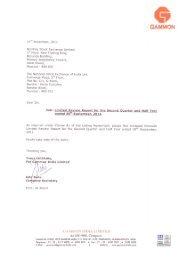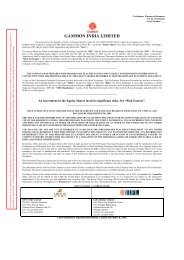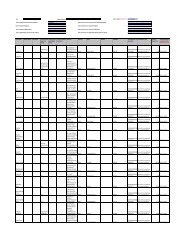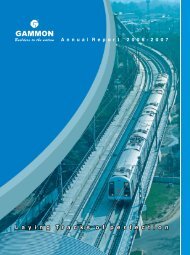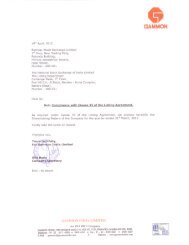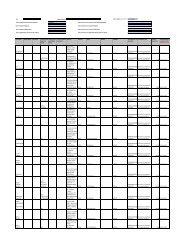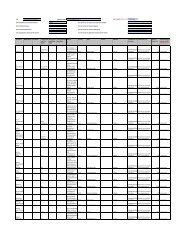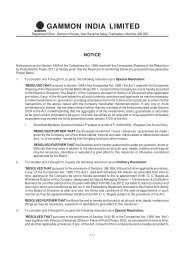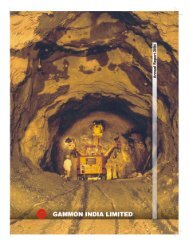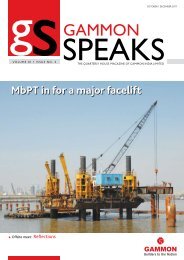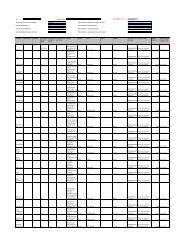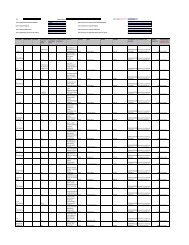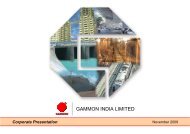GAMMON INDIA LIMITED
GAMMON INDIA LIMITED
GAMMON INDIA LIMITED
Create successful ePaper yourself
Turn your PDF publications into a flip-book with our unique Google optimized e-Paper software.
The tax benefits that our Infrastructure Development Businesses enjoy under the provisions of the<br />
Income Tax Act may not continue indefinitely.<br />
Because of the nature of our business, certain projects being developed by our Infrastructure Development<br />
Business enjoy tax benefits under the Indian Income Tax Act, including:<br />
a deduction equal to 100.00% of the profit from certain projects that we are developing for a period<br />
of 10 consecutive assessment years subject to MAT; and<br />
profits derived from certain types of housing projects approved before March 31, 2007 are not<br />
taxable.<br />
Some of these benefits are available only for a specified period of time and others are available only in<br />
respect of specific projects. As and when the specified period of time expires or specified projects are<br />
completed, our tax liabilities may increase, reducing our profitability. Further, there can be no assurance<br />
that the Government would not amend these provisions to our detriment, or that after the expiry of the<br />
specified period of time, the Government would extend these tax benefits or that it would not enact laws in<br />
the future that would adversely impact our tax incentives and, consequently, our tax liabilities and our<br />
profits.<br />
We currently enjoy certain tax benefits, and any change in tax policies applicable to us may affect our<br />
results of operations.<br />
Currently, infrastructure development projects enjoy certain benefits under Section 80IA of the Income Tax<br />
Act, 1961. As a result of these incentives, most of our projects are subject to relatively low tax liabilities.<br />
Our income tax exemptions for various projects expire at various points of time. There is no assurance that<br />
the infrastructure projects will continue to enjoy the tax benefits under Section 80IA in future. When our tax<br />
incentives expire or are terminated, our tax expenses will increase significantly, thereby reducing our<br />
profitability. Further, the Government may enact laws in the future that could adversely impact our tax<br />
incentives and consequently, our tax liabilities and profits.<br />
We face margin pressure as a large number of infrastructure-related contracts are awarded by the<br />
Government and State Governments following competitive bidding processes.<br />
Most of the infrastructure development contracts are awarded by the Government, state Governments or<br />
their respective authorized agencies through competitive bidding processes and satisfaction of other<br />
prescribed pre-qualification criteria. Once the prospective bidders clear the technical requirements of the<br />
tender, the contract is usually awarded to the most financially competitive bidder. We face competition<br />
from domestic and international companies, some of whom may operate on a larger scale than us and thus<br />
may be able to achieve better economies of scale than us. The nature of the bidding process may cause us<br />
and our competitors to accept lower margins in order to be awarded the contract, which may have an<br />
adverse effect on our business, financial condition and results of operations.<br />
The multiple role of certain Government entities as our regulator, customer, joint venture partner and<br />
direct or indirect competitor may give rise to conflicts of interest that may harm us.<br />
We have entered into agreements with Government entities, including NHAI, GCDA, PSEB, PPT, MbPT<br />
and the Board of Trustees of VPT, in various capacities. At the same time, some of these Government<br />
entities are also the counterparties in contracts entered into with our competitors, or in some cases, carry on<br />
activities that compete with our business. Further, in some other cases, Government entities are our<br />
competitors. We may face or suffer potential conflicts of interest, which may arise from the fact that such<br />
Government authorities play multiple roles in our business model. We cannot assure you that potential<br />
conflict of interest situations will not continue to arise in the future or that any disputes arising in relation<br />
thereto will be resolved in a manner favorable to us. Any such situation may have an adverse effect on our<br />
business, financial condition and results of operations.<br />
The risks associated with BOT and BOOT projects could adversely affect our financial results.<br />
As governmental and regulatory authorities seek greater private sector participation, we expect our exposure<br />
to BOT and BOOT projects, particularly in the area of transportation and hydroelectric power, to increase.<br />
Road projects are either toll based or annuity based. In the case of toll projects, the toll revenue is a function<br />
7


